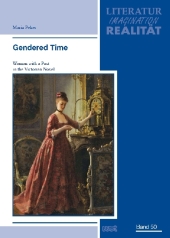 Neuerscheinungen 2015Stand: 2020-02-01 |
Schnellsuche
ISBN/Stichwort/Autor
|
Herderstraße 10
10625 Berlin
Tel.: 030 315 714 16
Fax 030 315 714 14
info@buchspektrum.de |

Maria Peker
Gendered Time
Woman with a Past in the Victorian Novel
Neuausg. 2015. 222 S. 21 cm
Verlag/Jahr: WVT WISSENSCHAFTLICHER VERLAG TRIER 2015
ISBN: 3-86821-632-4 (3868216324)
Neue ISBN: 978-3-86821-632-5 (9783868216325)
Preis und Lieferzeit: Bitte klicken
What is the relationship between gender and time? Do we experience time differently according to whether we are female or male? Do our lives follow different time patterns defined by the cultural construction and conception of gender? Is the traditional binary conception of gender reflected in the dual - linear vs. circular - perceptions of time? Even more intriguingly - what connection can there be between this dichotomy of time and famous Victorian "fallen women"? In her book, Maria Peker addresses these questions through the example of the Victorian novel and investigates how gender and time paradigms were interconnected in the works of Dickens, Thackeray, Trollope, and Hardy, among others. At the centre of the book is a literary figure who is known to the reading audience as "the woman with a past" and in whom these two main focuses - time and gender - are merged. This character type lends herself to demonstrating the significance of differences between the representations of time according to gender in Victorian literature and the consequences thereof for the general conception of gender differences in contemporary cultural discourse. The gendered time perspective is inextricably connected with the issue of female sexuality, and their mutual influence acts as a pivotal point in the book.
The gender-informed approach to time, more particularly past time, establishes a new perspective on the notorious concept of female fallenness in the Victorian period. The book argues that the category of Victorian "fallen women", among whom women with a past played an important, though until now largely underestimated role, has been erroneously homogenized by critical discourse and that not enough attention has been given to the differentiation and classification within this extensive group. The gendering of time is one of the tools to make vital distinctions between different types of fallenness, and, paradoxically, to figure out the crucial similarities between feminine purity and "ideal" fallenness. Victorian fallen women make a good case for demonstrating the significance of the temporal aspect in the narratives of gender.


